Clear Lake Cottage by MacLennan Jaunkalns Miller Architects
This lakeside lodge in rural Ontario was designed by Toronto firm MacLennan Jaunkalns Miller Architects as a weekend retreat for a family of five (+ slideshow).
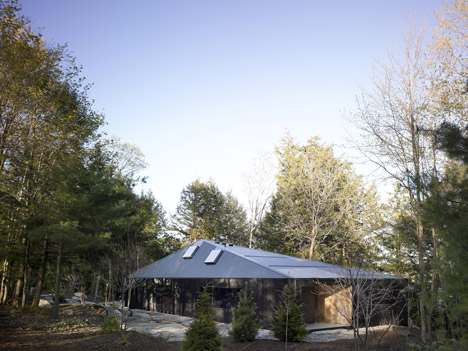
Clear Lake Cottage has a long narrow body with a metal-clad exterior and a hipped roof. It sits around 15 metres from the edge of the water and is tucked behind a cluster of trees.
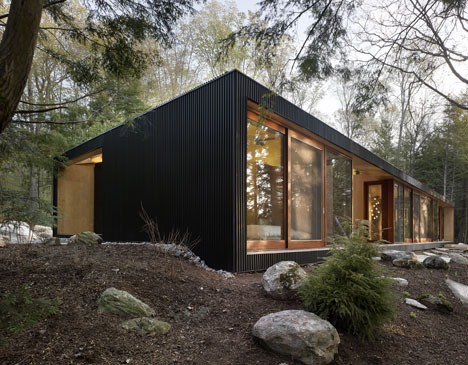
Replacing a smaller structure with a tin roof, MacLennan Jaunkalns Miller Architects (MJMA) was asked to design a residence that would open out to the landscape as freely as it predecessor.
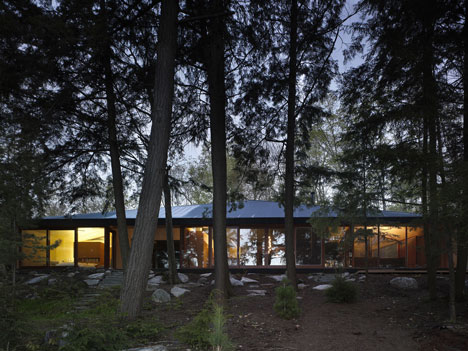
"The goal was to blend with the rural character of the quiet lake community and provide a clean modern environment that engages the landscape and captures a 'cottage' feel," explain the architects.
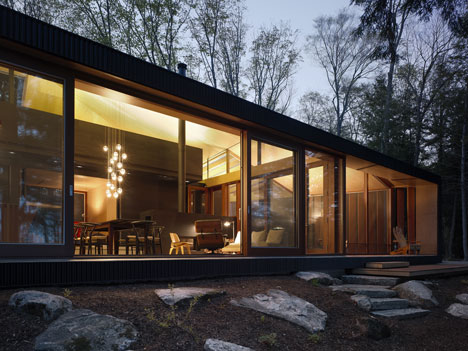
The building is orientated eastwards to maximise views towards Clear Lake. This elevation is also stretched outward at the corners, giving the building a trapezoidal plan.
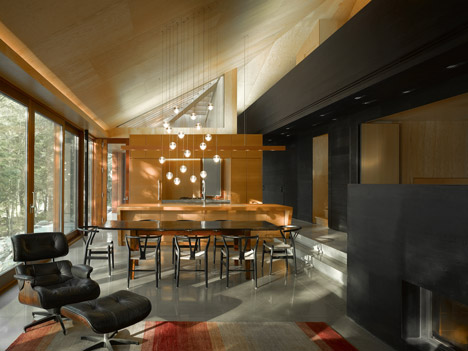
Rooms inside are divided into two rows, determined by different privacy requirements. Living rooms and a master bedroom are positioned along the front of the house, where they benefit from lake views, while extra bedrooms are lined up along the rear and include a first-floor loft inserted beneath the peak of the roof.
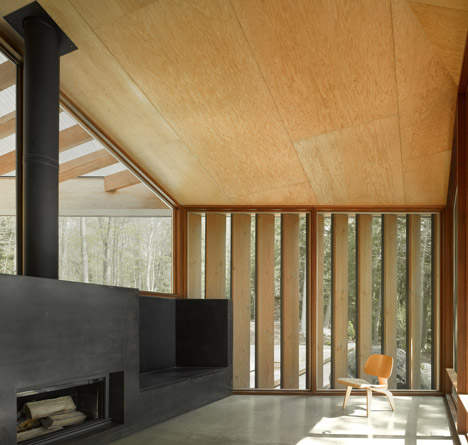
The smallest of two terraces sits within a recess on the eastern elevation, where it can catch the sun at breakfast time, and the second wraps around the north-east corner to provide an outdoor space beyond the living room.
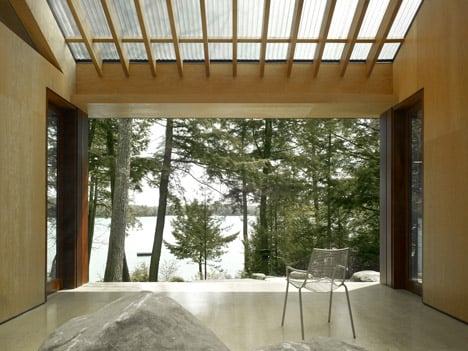
The architects used Douglas fir to construct the angled roof, then clad the exterior walls in black corrugated metal as a reference to tar-painted fishing shacks. "The result is decidedly modern, but raw and industrial too," they add.
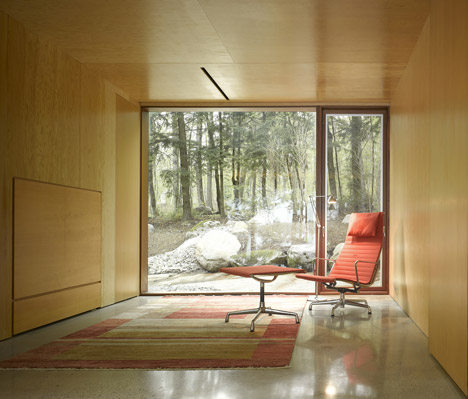
See more Canadian houses on Dezeen, including one that appears to be climbing up a hill and one with patterned walls of concrete brick.
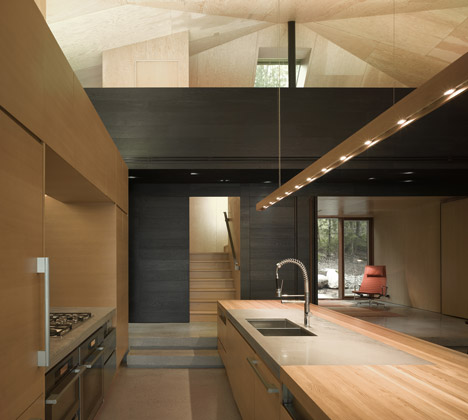
Photography is by Ben Rahn at A Frame Photography.
Read on more more details from MJMA:
Clear Lake Cottage
A Toronto family of five required a new four-season cottage to replace their existing 1950's structure. The goal was to blend with the rural character of the quiet lake community and provide a clean modern environment that engages the landscape and captures a 'cottage' feel.
The site is located on Clear Lake in Seguin Township, Ontario. The lot has a large frontage and an existing dock. The orientation is predominately to the east collecting warmth and direct light in the morning. The building sits quietly behind trees away from the water.
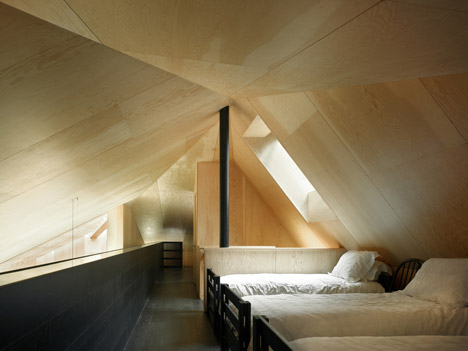
Outside of their direct program requirements there were two related and compelling goals the clients wanted to achieve. First they wanted all the benefits of modern design: clean lines, abundant natural light, connection with the outdoors; but they also wanted to blend contextually with the character and humility of the surroundings. Secondly, although they requested a winterised facility, they did not want to lose the connection with the land they had come to appreciate in their uninsulated, tin-roofed dwelling.
It was decided a peaked sloped roof would be used. This could achieve an ambiguously modern vernacular feel and was beneficial for snow and water shedding. Termed the 'Campsite' [like tents around a campsite]. This approach yielded interesting opportunities to define exterior spaces. To meet the budget a singular and rational peaked roof system was employed - 'the Bigtop'. A single tent pole supporting a giant hip roof housed the volumes below.
The program was consolidated into 4 logical masses: Master Suite, Bedrooms, Utility/Den and Living Space. These masses we arranged in terms of degree of privacy required; north to south. It was then determined which spaces would have forest views and which would have lake views. The masses were arranged to frame exterior spaces and capture an ambiguous indoor/outdoor condition. The plan was rationalised as a rectangle then skewed to a trapezoidal shape to maximise the lake front exposure.
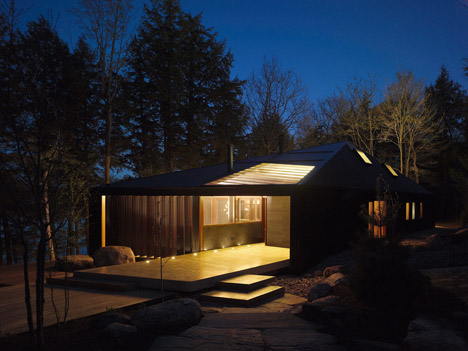
The resulting formal expression of the building expressed an archetypal 'house' quality. Roof and walls merge in a singular streamline form. This form captures within it outdoor spaces creating a spatial continuum inside and out. The massing along the forest side became connected above by an open loft space. This bedroom/utility bar is treated as a stained pine slat 'Black Box' and is an extension of the materiality of the exterior.
Punctures to the building envelope, and exposure of the Douglas Fir roof and wall structure capture outdoor space, and create a spatial continuum – a porosity of inside to out.
Taking cues from the client's fondness for Scandinavian fishing shacks, with their pine tar-painted cedar, the building is clad in black corrugated metal, a cost effective North American interpretation of this shoreline aesthetic. The result is decidedly modern, but raw and industrial too.
This approach to a 'high and low' material palette and divergent typologies is a strategy to disarm the precious nature of 'designed' space.
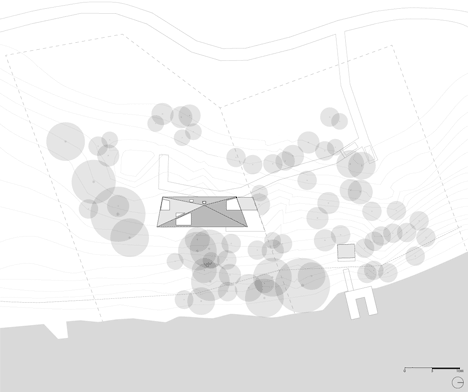
The interior is detailed to contrast the exterior black cladding. The interior material palette of Sapelle window frames, retroplate concrete floors, and Douglas Fir plywood works as a visual counterpoint to the dark, textured exterior finish. This conceptual reading reinforces the Scandinavian influence.
Douglas Fir plywood was selected based on the client's preference for a non-drywall interior shell. Exposed areas of Douglas Fir framing are either open to above (morning terrace) or clad with smoke-tinted corrugated acrylic (arrival spaces).
The rooms along the forest side support an upper open loft space. This bedroom/utility bar is treated as a stained oak 'Black Box' and is an extension of the materiality of the exterior – signifying enclosure.
The screened porch has a bi-folding partition opening it to the cottage interior. 50% of the glazed envelope can be left in the 'open' screened position allowing for the cottage to be exposed to breeze, fragrances, acoustics, and shadow play – capturing the natural feel of the site.
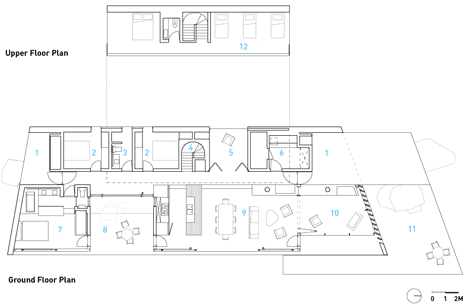
Location: Township of Sequin, Ontario, Canada
Architect: MacLennan Jaunkalns Miller Architects (MJMA)
Year completion: summer 2012
Project size: 215 sqm